Showing the greatest love a university can share over ‘education’ and ‘research’
Such Hanyang spirit is showing its potency in a big paradigm shift from ‘social volunteering that cures the wounds of the world’ to ‘social innovation that solves the root of those wounds.’ We would like to share how Hanyang University is raising its position as a global social innovation university that fulfills that social responsibility.
A New Paradigm to Cultivate and Support Social Innovators: HUGE
In May 2017, Hanyang University declared ‘Hanyang University for Global Engagement (HUGE),' a global vision to make a better world. Through ‘HUGE’, Hanyang trains students with innovative ideas, networks cultivated innovators, and runs funding programs that help to realize these ideas, cementing three major capacities as a changemaker: the public mind, value creation, and global networking.
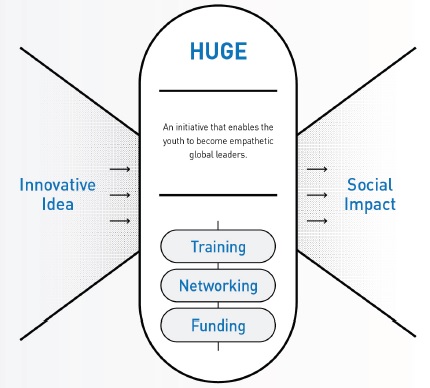
Students who have gone through regular educational courses connected from undergraduate to graduate school and extracurricular programs, can check their capacities and cultivate them through Hanyang’s networking programs. Such capacities are Hanyang’s vision that leads to social innovation’s virtuous cycle by becoming priming water for fundings from the government, local governments, and companies. Based on this vision, Hanyang University would like to continue making a ‘collective impact’ for a better world with governmental organizations, private companies, and NGOs, and check the actual results and share them through the annual Seventeen Hearts Festival (SHF hereafter) that Hanyang University holds every year.
Hanyang Changemakers, You are Changemakers!: Seventeen Hearts Festival 2019
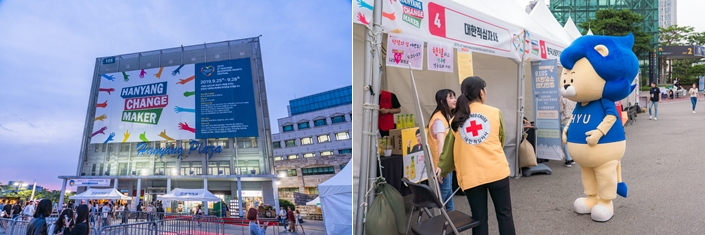
The Hanyang Social Innovation Center(http://hvc.hanyang.ac.kr) held the SHF for four days from September 25th to the 28th in 2019. SHF, which is the fourth time this year, has been growing as a festival that shares and cheers the various results of social innovation during the year led by youths in university, in the region, and the world under the goal to make a better world.
This year’s SHF delivered their message that anyone among Hanyangians can be changemakers who bring about positive change through the catchphrase of “Hanyang Changemakers, You are Changemakers!.” For this, it opened the SDGs Play Zone to easily learn social innovation and the UN’s Sustainable Development Goals, “Time to Open the Future” with ASHOKA Korea, “National Social Venture Competition” with Korea Social Enterprise Promotion Agency, and international conferences, so that people can experience these professional fields. The Social Innovation Center stated the purpose of SHF by stating, “We wanted to tell people that the practice of social innovation and SDGs is easy to do and needs not to be grandiose or professional. Various activities that think and try to make a better world can be social innovation.”
The First Step to Social Innovation: the Regular Program from Undergraduate to Graduate School
Hanyang University, chosen as the ASHOKA U Changemaker Campus for the first time in 2018, provides world-class social innovation education programs. ASHOKA has been discovering and supporting social innovators since 1980. Currently, 3,700 ASHOKA fellows are actively participating in their own fields, and three of them have received the Nobel Prize. Hanyang University runs the only comprehensive social innovation education program that undergraduates-masters-doctorates are connected by running a double major in the Social Innovation Program for undergraduate courses and graduate level courses in Global Social Economy. The double major in the Social Innovation Program has shown its popularity in particular since the number of students registering for the program has increased from 40 in 2018 to 90, with around 130 students currently participating. In the program, there are various subjects such as Understanding Social Innovation, the Social Entrepreneur Spirit, the Social Innovation Sympathy Practice, the Social Innovation Practice, Understanding International Development Cooperation, Climate Change and Impact Business, CSR and Social Innovation, the Sustainable City and Social Living Lab, and Impact Communication. Among these courses, many of them are done in IC-PBL (Industry Coupled Problem Based Learning), which results in education that connects companies, nonprofit organizations, and universities, creating an actual impact in various social fields.
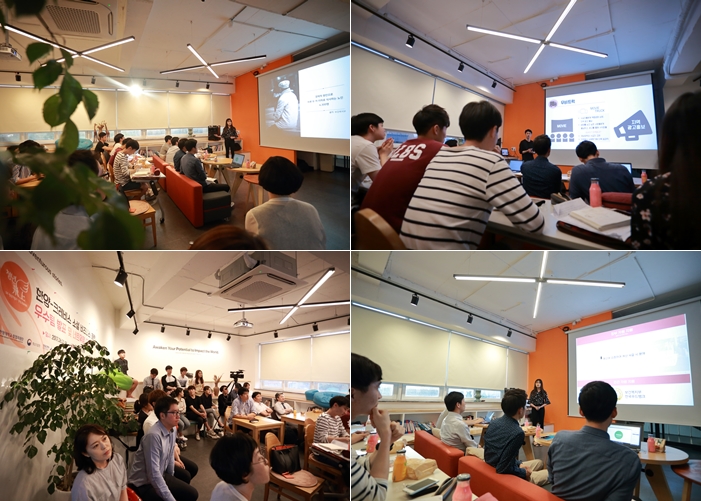
Hanyang’s outstanding educational programs are being acknowledged internationally. They were praised high by professionals, and Hanyang’s case was presented as the best educational case for social innovation that represents Korea at international events such as the Best Practice Session of Ashoka Exchange Conference (February 2019, the United States), the Stanford-Pecking University Social Innovation Conference (March 2019, China), the Interdisciplinary Social Innovation Research Conference (September 2019, the United Kingdom) and the BRICKS Conference (Hong Kong).
Fun Social Innovation: When Social Innovation and Playing Meet
Hanyang University is running the ‘Changemaker Group’ (CMG hereafter), which is a cross-sectoral (public-private-social-university) partnership-based consortium to solve local and societal’ problems, collectively. Design Thinking CMG, which creates new industries through design thinking and playing methodology, make active results by developing and producing learning materials for two years that people can learn social innovation and UN’s SDGs through playing with them. In relation to this, the CMG has launched an educational brand of “SDGs Changers Lab,” and with the production of educational kits that encompass toddlers to grown-ups, it has developed an educational course known as the ''Thinker-Maker-Entrepreneur Series Educational Course Through Playing Methodology.'
In particular, local societies and educational fields are interested in ‘Play with Goals,’ which is an SDGs literacy boardgame. As a cooperation-based boardgame, and not as a competitive game, it was designed to learn concepts of SDGs naturally, which can be played by rolling dice with players.
Researcher Yu Jeong-yun of Hanyang University's Design Thinking CMG said, “The goal of this project is not only to provide the young aged educational content but also to be applicable to university students and youths for startups and critical capacity education; thus, it contributes to solving the problems of the job search and startups since it can help even women with disconnected careers and seniors preparing for the retirement through the professional lecturer cultivation course. They can be dispatched to organizations that need the program.” The SDGs Changers Lab is going to run an educational volunteering program with a local children’s center and 10 elementary, middle, and high schools by organizing a volunteering group of 100 Hanyang students in January 2020.

Change the World with Gimbap and Ramyeon: KAINA
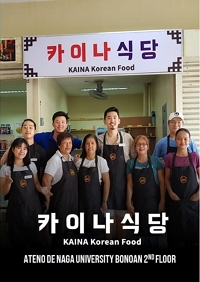
A Forum for Social Innovation Leaders: Asia Pacific Youth Exchange(APYE)
From 2018, Hanyang University holds APYE Korea every summer vacation to enhance youths’ social innovation practicing capacity. The program is co-held with Urban Youth Academy (UYA), Asia Development Bank (ADB), and United Nations Development Program (UNDP) that runs APYE in four different Asian countries. The APYE is a global social innovation leadership development program that seeks ways to reach the UN’s SDGs with youths from Asia Pacific regions gathered and the participation is growing as the years go by. In this year, around 200 youths from 20 different countries participated and the event was held from August 18 to 27 in relation to Multi-cultural Family Supporting Centers (Seongdong-gu of Seoul, Danwon-gu of Ansan, Dalseo-gu of Daegu) under the theme of “SDGs for Multiculturalism in Korea”. Especially, “Deonurim” program which helps economic independence of families that are laid helpless among multicultural families got a lot of attention. Students got positive evaluations from local residents and professionals as they suggested an idea to expand the marketing or to solve multicultural children’s problems that they suffer right after they start attending elementary school through video games. Ideas that people suggest in APYE can be practical only when local people accept them via professional’s consultations. The representative case of it is KAINA in the Philippines and ideas that will come up in future APYE that aim to create sound communities in relation to SDGs can become another model of KAINA.
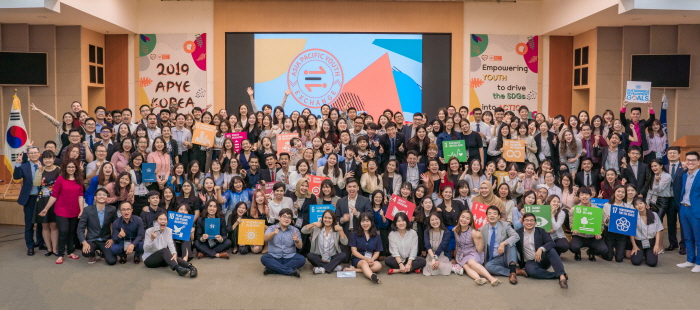
Leading the Social Innovation Research: Stanford Social Innovation Review in Korean
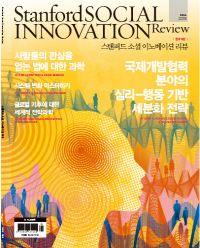
Hanyang University, the first Ashoka U ChangeMaker Campus in East Asia, exclusively signed the right of publications in Korea with Stanford University and positioned itself as the front runner of social innovation research, worthy of its name. A total of three journals were published since last November, and the latest issue published in October of 2019 includes the first local content of social innovation cases within Korea. The importance of local content is expected to increase in the future, and be translated into English so that this contributes to announcing the excellent cases of Korea to overseas as well.
Meanwhile, SSIR and Hanyang University are hosting an international conference in a yearly custom since year 2018. This year’s conference was held for two days from October 29~30th, and many local and overseas institutions including the Asian Foundation, British Council, and Hyundai Chung Mong-Koo Foundation participated. The theme of the conference was “Scaling Collective Impact,” and worldwide professionals from nearly 10 different nations participated and shared their experiences and know-how with the audience. Some of the main presenters were professor Michael Frese (National University of Singapore), who recently presented the results of startup education in developing countries based on psychology in the Science journal, global impact measurement professional Jyotsna Puri, also a professor (GCF & Columbia University), president Seo Sang-mok (Korea National Council on Social Welfare), the former Minister of Health and Welfare who has been arguing for balance in the economy and welfare through World Bank and KDI, and Robinah Birungi, the director of Mango Fund, who has been implementing impact investment in Uganda.
As introduced in the following, Hanyang University is striving to ‘create a better world’ on the global stage. Also, ‘love in deed and truth’ is the cultivation of educational ideals, with effort to foster Changemakers that will lead in social innovation worldwide. We anticipate Hanyang’s title to be in sites where activities aim to better the lives of humanity and create happiness on the global stage.
Written by: Social Innovation Center(SIC) , Eunjung Kim
글로벌뉴스팀
global@hanyang.ac.kr

